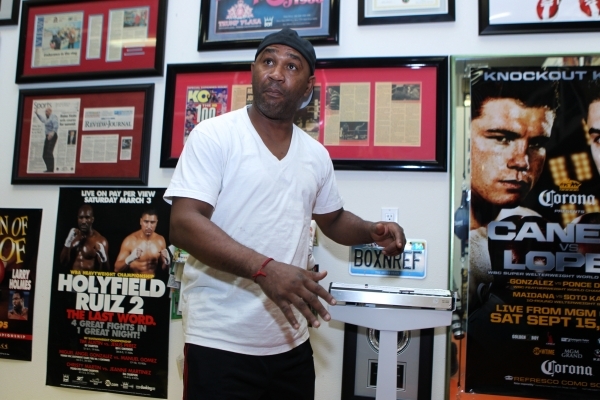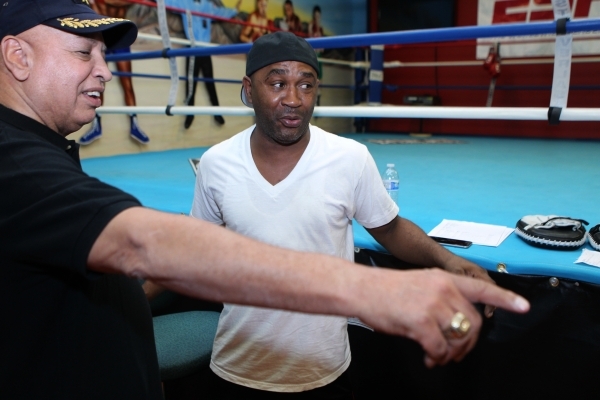Las Vegas boxer vows to find Olympic medal taken after defecting to U.S.
Joel Casamayor remembers the last time he stood before Fidel Castro.
He was tall, Casamayor said, dressed in his trademark green military fatigues. Moving his gaze from the long, gray beard to the face of his country's dictator, the lithe, 5-foot-7 bantamweight boxer felt an unfamiliar emotion: fear.
"Your heart rate goes up, you begin to shake," Casamayor said in Spanish, through a translator. "Some people fall to their knees."
Few people see Castro — exceptional baseball players, surgeons, and boxers, like Casamayor.
Nicknamed El Cepillo, or "The Brush," for his short, choppy uppercuts that cleared opponents from his reach, Casamayor, who now lives in Las Vegas, met Castro in 1989 after winning gold at the World Junior Championships in Puerto Rico and again in 1992, at age 21, after taking gold at the Barcelona Olympics.
The boxer and the dictator might have met a third time, but Casamayor defected before the 1996 Olympics in Atlanta. He left Cuba an amateur, and would go on to win four world titles as a professional, make and spend $18 million and bring his beloved mother to the U.S.
But a lingering wound continues to haunt him. He wants something he says Castro took from him: his Olympic gold medal.
'SOLD HIMSELF FOR A COCA-COLA'
Casamayor has told his defection story many times before, how he escaped the Cuban team's training compound in Guadalajara, Mexico before the 1996 Olympics.
This time the interview is in a posh, private boxing gym in the northwest Las Vegas Valley owned by Hall of Fame boxing referee Joe Cortez, who is translating. Casamayor 44, is now an ex-pro in basketball sneakers and a white V-neck T-shirt that spills slightly over his black gym shorts, regarded as perhaps the best Cuban boxer since Teofilo Stevenson.
The first time he told it he was under a freeway overpass in Los Angeles, a week after leaving Guadalajara. With the American press assembled, Casamayor said he "would rather die than box for Fidel Castro."
One person Casamayor apparently hadn't told of his plant to leave Cuba forever was his mother.
Sometime, either before or after the press conference, a knock came at his mothers door, she later told him, more than two thousand miles away in Guantanamo, Cuba.
When she opened it, a tall, overweight soldier brushed past her onto the dirt floor of her home.
"What do you want?" she asked.
"Give me the medal," he replied.
"Are you crazy?" she responded.
Taking the medal from Casamayor's trophy case, where it sat among all of his other boxing accolades, the soldier wrapped the tri-colored ribbon around his wrist and headed for the door. "Your son sold himself for a Coca-Cola," he said.
Then, reaching into his pocket, he flashed a military ID.
"I'll see you," he said, and walked out the door.
His mother collapsed on the floor.
'THE RIGHT OF THE PEOPLE'
Professional sports were abolished at the beginning of the Fidel Castro regime in favor of amateurism, with Castro declaring sports to be "the right of the people." With the aid of Soviet trainers, the Cubans developed a tremendous boxing tradition, winning dozens of medals in Olympics over the decades. Like Soviet leaders, Castro saw international athletic competitions as a forum to win prestige and burnish national pride.
Cortez, the gym owner and Hall of Fame boxing referee, said the state provides everything for the boxers.
"They put you in a good academy, they feed you three meals a day, and you get to have good equipment and good trainers," Cortez said. "If you're not into boxing you'll be in the street, probably shining shoes."
Casamayor was no different. He grew up in the streets of Guantanamo, a town of more than 200,000 on Cuba's eastern coast that is famous for its athletes, not to mention the nearby U.S. Naval base.
By age 10, Casamayor's boxing abilities attracted the notice of coaches, who offered him a scholarship in one of the Cuban sports academies. He progressed quickly, winning local, then regional, then national championships by age 16. At 17, he won a world amateur title in Puerto Rico, and met Castro face-to-face.
Had he not been in the academy, Casamayor said he likely would have been selling mangoes on the street.
TAKING MEDALS, MOVING FAMILIES
Robert Boland, a sports and business law professor at Ohio University, said the confiscation of Casamayor's medal fits with the nature of the Castro regime.
"That's both philosophically their view of personal property as possibly the last communist country in the world, and practically, that this was earned on their dime," Boland said.
Luis deCubas, a veteran Cuban trainer in Miami who has managed Casamayor, two-time gold medalist Guillermo Rigondeaux and a host of other Cuban fighters, said other boxers who have defected have had their families moved out of state-supplied housing, or had cars taken away.
That habit has not been affected by the diplomatic thaw between the U.S. and Cuba, according to Peter Bjarkman, a Cuban baseball historian who is writing a book about athlete defections. When two baseball players attempted to defect to Puerto Rico in February, the government moved the wife and child of one of them out of government housing.
"[The regime will] want their property back. They've given it to you, they trained, they paid for it, you've become a world champion, they own you. They take the best athletes, they take them to Havana, and they feed them," DeCubas said. "They figure that when you leave, whatever you left behind is theirs."
It also fits into a pattern of threats intended to keep star athletes on the island. When Soviet funding flowed freely to Cuba during the 1960s and early 1970s, Boland said, the regime made sure that athletes lived much better lives than regular citizens. As that supply broke down in the late 1970s through the 1980s, then evaporated with the fall of the Soviet Union, the regime resorted more to intimidation.
"It was widely commented that if you left your family would be jailed, that they would lose what they had, that elderly relatives would be thrown into work camps," Boland said. "So that fear if you left is what kept many athletes in place."
That fear of reprisal might make Casamayor's plight sympathetic to the International Olympic Committee, Boland said.
As the Cold War evolved, the IOC tried to take a role above politics, recognizing in its charter the rights of individuals to freedom of expression and freedom from discrimination.
The IOC press office in Lausanne, Switzerland did not respond to an email seeking comment about Cuban athletes whose medals were seized by the state.
FINDING A MEDAL NO EASY TASK
Casamayor's wish could also be interesting in light of continuing process of normalization between Cuba and the U.S. A key next phase in the process is settlements on claims by American citizens and companies for nearly 6,000 properties that were seized by the Castro regime following the communist takeover.
But there could be complications beyond the slow warming of international relations.
If history is any guide, it's likely Casamayor's medal has already been sold, according to Don Bigsby, a retired telephone engineer who has been collecting Olympic memorabilia since the 1980 games in Lake Placid, N.Y.
Cuban medals frequently appear at auctions, Bigsby said, and he estimates he has purchased ten himself.
"I do know a lot of collectors have some from Cuba," Bigsby said. "And I do know they were snuck out."
Cuban boxers Odlanier Solis, Yuriorkis Gamboa and Yan Barthelemy told the U.K. newspaper The Guardian they sold their gold medals from Athens 2004 to feed their families before defecting in 2006.
Casamayor believes his Olympic gold medal is now in a museum somewhere in Cuba.
THE NEXT ROUND
Casamayor retired after a 2011 loss to Timothy Bradley. Little of his career earnings remain. He's a father of nine children. But he has a plan for his next act in life: he wants to be a good coach.
Each day he catches a ride to the Feroz Fight Factory on North Civic Center Drive, just north of Cheyenne Road, in North Las Vegas to train young amateur fighters. He would love to train a world champion one day.
And he still thinks of the day when he will return to Cuba.
When El Cepillo finally goes back, he explains, it will be a big deal there. Whatever he wants will be his. But the government will keep a sharp eye on him. They will watch where he is going, who he is with. They'll want to see if he's after some young fighters, he says. Who knows? Might they take away his freedom again? He'll have to be very calm, just see his family and friends.
"I'm working to get things going," he said. "I know something good is coming my way.
"But the thing I want is that gold medal."
Contact Knowles Adkisson at kadkisson@reviewjournal.com or 702-224-5529. Find him on Twitter: @knowlesadkisson.




















